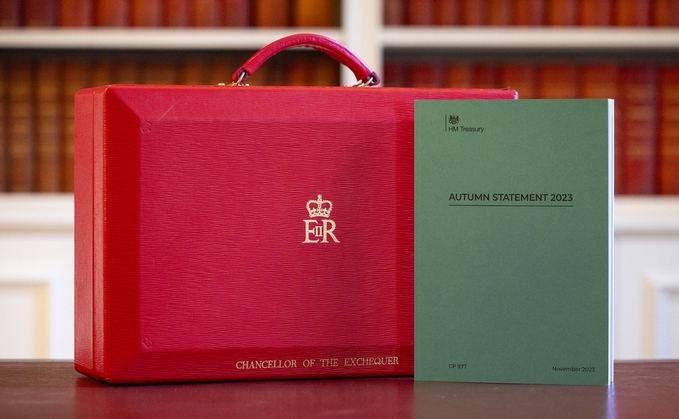
Copyright HM Treasury
The Autumn Statement has announced a comprehensive package of pension reform to provide better outcomes for savers, drive a more consolidated pensions market and enable pension funds to invest in a diverse portfolio.
The government said these measures represent the "next steps" of the chancellor's Mansion House Reforms and met the three golden rules: to secure the best possible outcomes for pension savers; to prioritise a strong and diversified gilt market; and to strengthen the UK's competitive position as a leading financial centre.
It said this package built on the momentum from industry over the summer which has seen further signatories join the Mansion House Compact, taking the total number to 11; the launch of the British Venture Capital Association's Venture Capital Investment Compact and the Mansion House Pension Summit, which brought together pension funds, trustees and private market investors for the first time.
The measures announced include:
Call for evidence on ‘lifetime provider model' and small pots consultation response: The government is launching a call for evidence on a lifetime provider model to simplify the pensions market by allowing individuals to move towards having one pension pot for life, and on a potential expanded role for collective defined contribution (CDC) schemes in future. The government said it will also introduce the multiple default consolidator model to enable a small number of authorised schemes to act as a consolidator for eligible pension pots under £1,000.
See also: Industry reaction - 'A sea-change in workplace pension provision'
PPF as public consolidator for DB pension schemes: The Department for Work and Pensions (DWP) will launch a consultation this winter on options for defined benefit (DB) schemes, currently unserved by the market and "unattractive to commercial providers", to consolidate into a new statutory vehicle run by the Pension Protection Fund.
Surplus extraction arrangements for DB pension schemes: DWP will launch a consultation this winter on the appropriate regime under which surpluses can be repaid and enabling 100% PPF coverage for DB schemes that opt to pay a higher levy. The authorised surplus payments charge will be reduced from 35% to 25% from 6 April 2024.
Pension investment expertise and skills: In its response to the DWP's call for evidence on pension trustee skills, capability and culture, the government said it supports TPR's plans to implement a register of trustees to aid engagement with trustees and to update the trustee toolkit to include further information on productive finance.
Local Government Pension Scheme (LGPS): In its investment reform consultation response, the government confirmed that LGPS guidance would be revised to implement a 10% allocation ambition for investments in private equity, which is estimated to unlock £25bn, as well as a March 2025 deadline for the accelerated consolidation of LGPS assets into pools, and setting a direction towards fewer pools exceeding £50bn of assets under management.
Solvency II Reform: The government announced reforms to Solvency II, the prudential regulatory regime for insurers, at Autumn Statement 2022. The government said it will be introducing secondary legislation to give effect to these reforms in a bid to deliver a more tailored, clearer, and simpler regulatory regime for the insurance sector, and incentivising private investment in long-term productive assets.
Lifetime allowance (LTA): The abolition of the lifetime allowance (LTA) for pension savings is on schedule and will be complete by 6 April next year.
The removal of the LTA - the maximum amount people can contribute to a pension pot without triggering tax charges - was announced in the Spring Budget. Documents released alongside today's Autumn Statement said the government "will legislate in the Autumn Finance Bill 2023 to remove the lifetime allowance".
Growth Fund: The government confirmed its intention to establish a growth fund within the British Business Bank (BBB). The growth fund will give pension schemes access to the BBB's pipeline of opportunities, crowding private capital into the UK's most promising businesses.
Master Trust Review: The government has published the DWP's and TPR's joint review of the master trusts market - examining the authorisation and supervisory regime and the wider market; looking at market segmentation, costs, charges, consolidation, increasing scale, and the relationship with the Chancellor's Mansion House Compact and other DWP policies and policy proposals.
Commenting on the review, TPR interim director of regulatory policy, analysis and advice Louise Davey said: "We want a master trust market increasingly focused on value, not just cost.
"Our evolved regulatory approach will put greater focus on investment governance, raise standards of trusteeship, build scale and expertise to facilitate investment in a diverse range of assets and ensure savers receive value."
Update on implementing the Value for Money (VfM) framework: The government said it welcomes the Financial Conduct Authority (FCA) and the Pensions Regulator (TPR) announcements on next steps towards implementing the VfM framework in the defined contribution (DC) workplace pensions market.
The FCA will consult on rules for contract-based schemes in Spring 2024, working closely with the government and TPR for consistency with the development of legislative requirements for trust-based schemes. In the meantime, actions from the TPR will strengthen their existing supervisory approach.
In response, TPR issued a statement on VfM - explaining how TPR is looking at options to embed the disciplines of the joint DWP, FCA, TPR VfM framework ahead of legislation. It said it was "committed" to a holistic framework that can be applied consistently across the entire DC market.
TPR interim director of regulatory policy, analysis and advice Louise Davey added: "A VFM framework can only work if there is a level playing field across trust and contract-based pensions. That's why we continue to work with the FCA to develop their rules in anticipation of legislation for trust-based schemes.
"We will continue to jointly engage the market and devise joint policy solutions and want trust-based schemes to engage with the FCA's consultation. This will help ensure there are no barriers to implementing the framework for trust-based schemes."
Update on saver choices at retirement: The government said it is publishing an update that proposes placing duties on occupational pensions trustees to offer decumulation services and products at an appropriate quality and price when savers access their pension assets, either themselves or through a partnership arrangement. It also sets out the intention to further explore the development and wider use of CDC schemes as part of a long-term vision for pension saving in the UK.
Long-term Investment for Technology and Science (LIFTS): Subject to final agreement, the government said it would commit £250m to two successful bidders under the LIFTS initiative. This will create new investment vehicles tailored to the needs of pension schemes, seeking to generate over a billion pounds of investment to support the UK's most promising science and technology businesses.
Prioritising long-term pension investment performance over low fees: Building on the guidance and commitments made by the Productive Finance Working Group, the government said it would engage with industry on proposals to ensure that all aspects of the pensions market are playing their part to support best outcomes for savers. This will include how to shift employer incentives away from low fees towards long-term pension investment performance. It said TPR will provide further information for employers on what factors should be assessed when they are selecting a pension scheme.
Public Service Pension Schemes (PSPSs): The government said the PSPSs are in the process of finalising outcomes of the 2020 valuations, which will determine employer contribution rates for PSPS from April 2024 onwards.
It said these valuations are based on the revised Superannuation Contributions Adjusted for Past Experience (SCAPE) discount rate. Following a review of the SCAPE methodology, and the latest OBR forecast of expected long-term GDP growth, HM Treasury confirmed the new SCAPE discount rate of 1.7%+CPI per annum on 30 March 2023.








